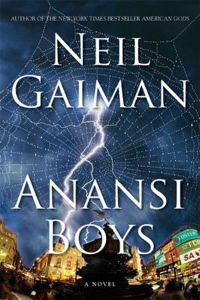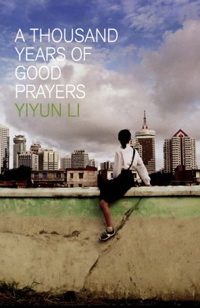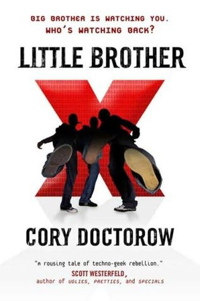Book review blog
 Anansi Boys
Anansi Boys
By Neil Gaiman
Reviewed by Stephany Yong, 15, Walnut HS
Anansi Boys by Neil Gaiman is a quick-paced novel that can’t be categorized. Balancing fantasy (African animal gods who can move between universes) and the harshness of reality (a demanding mother-in-law and scheming boss), Gaiman tells the story of Fat Charlie Nancy, a down–on-his–luck talent agent who finds out that his dead estranged father was Anansi, the African trickster god.
To sum up Gaiman’s zany plot, Fat Charlie is your typical Average Joe who wants nothing but to live his life unnoticed and trouble-free. After his father dies, Fat Charlie attends the funeral and learns that his father was Anansi. Fat Charlie can’t believe it, since his own life has been nothing short of uneventful. Right after the funeral, Fat Charlie also learns that he has a brother, Spider, who arrives on his doorstep two days later.
Fat Charlie seems exceptionally awkward compared to the handsome Spider, whose god-like smooth talk entices anyone to do as he wishes. As Spider creates trouble in Fat Charlie’s lovelife and at his job, Fat Charlie wants to get Spider out of his life. So he enters another universe (with the help of his childhood neighbors) and unknowingly trades his and Spider’s lives with the Bird Woman, Anansi’s enemy. After he realizes he made a decision that could lead to their deaths, Fat Charlie starts on an epic journey to save their lives.
Although this novel falls under the fantasy genre, it’s the characters that make it so real. Fat Charlie is dealing with problems we all face: jealousy, problems at work and relationship issues. He has a pessimistic attitude and seems to hate his life at times. Fat Charlie is not your average hero, which makes him every bit more heroic.
My favorite aspect of the novel is the relationship that Fat Charlie builds with his dead father. The complications that his father leaves behind ultimately bring Fat Charlie and Spider together, enabling Fat Charlie to come to better terms with who he is and his father’s memory.
In comparison to his brother, Fat Charlie is unattractive, boring, and the epitome of an underdog. As he loses his job and the last shreds of approval from his mother-in-law, I sympathized with Fat Charlie. His relationship with his father can be summed up in one word: embarrassment. Anansi was spontaneous and loved karaoke while Fat Charlie disapproves of any public displays of excitement or emotions that may lead to humiliation. The fact that Fat Charlie is so self-conscious is what makes him so likeable, since everyone has a little bit of Fat Charlie in them.
Because Anansi Boys has so many themes, it gives way to many questions. Is it a quest for Fat Charlie to save him and his brother from the wrath of the other animal gods? Or is a coming-of-age story in which Fat Charlie learns to take life less seriously and appreciate his father? Or is it a satire humorously depicting Fat Charlie’s struggles with a boss who is out to get him and evil mother-in-law? Gaiman blends these ideas so that the reader barely notices the genre blending.
Gaiman achieved something that few authors can create. He combined different themes, subplots and moods to create one beautiful book that leaves the reader with a sense of completion. During the summer, I just wanted to read something enjoyable without having to ponder any philosophical ideas or SAT vocabulary words. Gaiman’s skillful storytelling proved that even thought-provoking themes could be highly enjoyable. Anansi Boys achieved everything a summer reading book should be: humorous, satisfying, and a break from the conventional novel.
 A Thousand Years of Good Prayers
A Thousand Years of Good Prayers by Yiyun Li
Reviewed by Lia Dun, 17, Marshall HS
I’m a Chinese American, and my father always tells me about how the communists took away his grandfather’s land at the beginning of the Communist era in China. Most of the time, I tune him out because he says the same things over and over again. But the 10 short stories in Yiyun Li’s A Thousand Years of Good Prayers immediately drew me in because of their vivid portrayals of modern China.
All the stories are about ordinary people who are victims of China’s communist regime. For example, in the story “Immortality,” a man who looks like Mao Zedong becomes the dictator’s double to attend public events, a job that eventually leads to his undoing. And in the story “The Princess of Nebraska,” one of the characters has to flee China because the government feels threatened by his agitation for gay rights.
In my favorite story, “Persimmons,” a group of Chinese men recount the trial and execution of a man from their village who murdered 17 people—all related somehow to the Chinese government. At first, I thought the murderer was insane until I learned at the end why he killed the 17 people. I like the way Li slowly reveals information about the man because by the end, I had gained a completely different perspective of him without even knowing it.
Li’s writing is clear and easy to read. As a Chinese American, I loved how much I learned about China. Each story explores aspects of Chinese life and is fascinating to read. Anyone who wants to read some well-crafted short stories and learn more about communist China should read this book.
 Little Brother
Little Brotherby Cory Doctorow
Reviewed by Ernesto Pineda, 17, Animo Film & Theatre Arts Charter HS
Little Brother, by Cory Doctorow, is about a boy who is tortured by the Department of Homeland Security and uses his knowledge about technology to devise a plan to get revenge. The imaginative book about how we find terrorists and how some organizations or people abuse power got me hooked and I didn’t want to put it down.
The main character, Marcus, is a 17-year-old computer geek at a high school in San Francisco. One day he and his friends ditch school to go hunting for clues to their favorite game, called Harijuku Fun Madness. In the game they use their cell phones to find wireless connections that lead them to clues. It leads them to the Bay Bridge. A few minutes later, the bridge blows up. As they’re trying to escape the crowd, a suspicious minivan stops, and then Marcus and his three friends are hooded and abducted. It turns out to be the Department of Homeland Security. Since Marcus and his friends were near the Bay Bridge, they are suspects. Over the next three days, he is interrogated and tortured. When he is released they warn him, “You’re a marked man now.” Two of his friends are also released but one, Darryl, is missing. Marcus promises to get revenge.
Meanwhile, Homeland Security has turned San Francisco into a police state. They’re trying to prevent anything else from happening by taking over San Francisco. The schools have cameras. Homeland Security even monitors what people buy. I was surprised by how easily Homeland Security was able to take away people’s privacy. Nobody wants to be tracked when they buy stuff. It made me wonder if our government can do the things portrayed in Little Brother. Does Homeland Security really grab people and interrogate them at random? What are their powers? What is their objective?
People think Homeland Security is just trying to keep them safe. Marcus thinks otherwise. He wants to reveal the truth about how Homeland Security is holding innocent people as prisoners and how it’s abusing its power. Homeland Security might be watching, so he’s really cautious. He uses his smarts to avoid being caught. He uses a program to send encrypted messages to his friends so Homeland Security can’t track him. Throughout the whole book, I was wondering, “Is he going to get caught?”
I would really recommend this book to people who like suspenseful books about technology. At times I wouldn’t notice time flying by as I read. During class I should have been doing work but I kept reading. Marcus is like a super hero.
Also check out L.A. Youth’s summer reading list.

